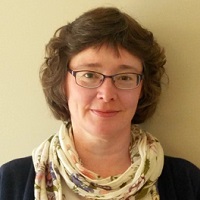 Christine McCabe, College Spark Washington
Christine McCabe, College Spark Washington
Title: Executive Director
On the job since: 1999
Foundation founded in: 2004 as a foundation (1978 as an organization)
Geographic scope: Washington state
Grants made in 2015: $6.8 million
Staffing: 5 FTE
How has the path to high school and college success changed since you were a student?
We’re fortunate in Washington that more students than ever are graduating from high school and enrolling in college. Many of these students are the first in their families to attend college; their success will be essential to our state’s future economic success. But it also means that many students aren’t from families familiar with college requirements and expectations, and we need to make that path clearer.
What are the biggest obstacles to improving graduation rates in your community?
A very big obstacle is the lack of alignment between high school graduation requirements and college-entry expectations. A contributing problem is that people confuse college admission with college placement: you can be admitted to a college, but end up placed remedial classes that do not earn college credits. Our community college system has improved enrollment broadly across the state, but the majority of entering students are not placing into college-level classes. Washington has taken steps to improve and clarify the college-level expectations, but students need more support to meet those expectations and teachers need more assistance to make that happen.
What are your core strategies for supporting students and improving graduation rates from high school and/or college?
College Spark funds college readiness and completion programs for low-income students throughout Washington state. Our core strategies focus on:
- Preparing students for college and career-ready pathways earlier in school, especially in math.
- Aligning high school preparation with college-level expectations.
- Creating clear pathways for students to persist through and complete their college programs.
College Spark is also supporting middle schools using growth mindset and early warning indicator strategies to increase math success and student engagement; funding Bridge to College transition courses that enable high school graduates to be placed directly into and succeed in credit-bearing college classes; and just launched a Guided Pathways initiative to help colleges streamline the paths to degree completion, improve advising services and enable students to navigate to their goals.
How are demographics changing and affecting your funding priorities and strategies?
Currently, Washington state imports more than 70% of bachelor’s degree holders from outside the state. As more jobs require some level of post-secondary credential, we must ensure that more students not just finish high school, but also earn those college credentials. And the number of children living in poverty has grown, with 18% of kids living in poverty. So, improving the college completion rate for Washington residents means we must improve the success of our low-income students.
What’s been a big success for your organization related to supporting high school and college students?
Two long-term efforts recently finished their grant funding periods and we’re continuing to monitor the impact on students and apply lessons learned to our other grant programs:
- In our College Readiness Initiative, we funded a combination of academic preparation and counseling through AVID and Navigation 101 (now Career Guidance Washington). We funded the efforts in 19 school districts but saw the programs grow to more than 300 AVID schools and 500 Navigation 101 schools across the state. Schools in the programs increased the number of students meeting key academic milestones, graduating from high school, and enrolling in college.
- The other program, Achieving the Dream: Community Colleges Count, emphasized helping community colleges use data to drive decision-making and identify practices that actually increase student persistence and completion. Despite having higher numbers of low-income students and students of color, we saw these colleges outperform peers on measures of student persistence and completion and, over time, other colleges began implementing similar practices.
We’re using what we learned in these efforts to shape our current grants with schools and community colleges.
What are the most important public policy issues for you this year, and what are you doing about them?
Education funding is the public policy issue dominating everyone’s attention, as the Washington legislature is under a court-imposed deadline to address basic education funding. But, at College Spark, we believe that philanthropy should do more than support policy adoption; we must support policy implementation because otherwise, implementation is where policy goes to die. So, we’re focused on supporting schools and colleges in actually implementing techniques that help students meet the goals behind new policies like higher graduation standards. If we’re going to adopt policy goals, educators need the time, tools and training to implement them.
What’s one more question we should ask, and how would you answer it?
Q: What do you wish you’d done differently?
A: Two things that I wish we’d done earlier at College Spark are:
- Refine our focus on the outcomes we wanted to measure, so grantees trying different things had more opportunities to learn from each other.
- Use baseline data so we could see not just the numbers of students reaching milestones but also whether strategies improved outcomes significantly from the baseline.
It took us a few years to get those approaches in place, and they’ve made a big difference in helping us prioritize where to put our grant funds.
Call us. Really. College Spark staff are happy to talk with other foundations about what worked — and didn’t — for us, and to identify resources specific to particular questions. A lot of our work was informed by conversations with our peers at other foundations, and our grant strategies benefited from their insights. Philanthropy is very lucky to be field where many peers talk freely to each other, and we should use that advantage more.
Christine McCabe is executive director at College Spark Washington, joining us this month for our virtual roundtable with graduation funders.